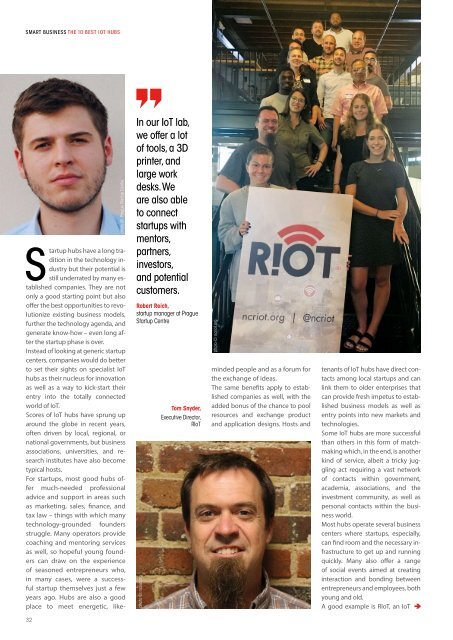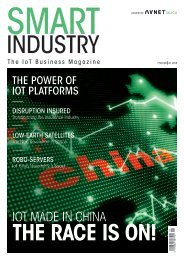Smart Industry 2/2018
Smart Industry 2/2018 - The IoT Business Magazine - powered by Avnet Silica
Smart Industry 2/2018 - The IoT Business Magazine - powered by Avnet Silica
You also want an ePaper? Increase the reach of your titles
YUMPU automatically turns print PDFs into web optimized ePapers that Google loves.
<strong>Smart</strong> Business The 10 best IoT Hubs<br />
photo ©: Prague Startup Centre<br />
Startup hubs have a long tradition<br />
in the technology industry<br />
but their potential is<br />
still underrated by many established<br />
companies. They are not<br />
only a good starting point but also<br />
offer the best opportunities to revolutionize<br />
existing business models,<br />
further the technology agenda, and<br />
generate know-how – even long after<br />
the startup phase is over.<br />
Instead of looking at generic startup<br />
centers, companies would do better<br />
to set their sights on specialist IoT<br />
hubs as their nucleus for innovation<br />
as well as a way to kick-start their<br />
entry into the totally connected<br />
world of IoT.<br />
Scores of IoT hubs have sprung up<br />
around the globe in recent years,<br />
often driven by local, regional, or<br />
national governments, but business<br />
associations, universities, and research<br />
institutes have also become<br />
typical hosts.<br />
For startups, most good hubs offer<br />
much-needed professional<br />
advice and support in areas such<br />
as marketing, sales, finance, and<br />
tax law – things with which many<br />
technology-grounded founders<br />
struggle. Many operators provide<br />
coaching and mentoring services<br />
as well, so hopeful young founders<br />
can draw on the experience<br />
of seasoned entrepreneurs who,<br />
in many cases, were a successful<br />
startup themselves just a few<br />
years ago. Hubs are also a good<br />
place to meet energetic, like-<br />
In our IoT lab,<br />
we offer a lot<br />
of tools, a 3D<br />
printer, and<br />
large work<br />
desks. We<br />
are also able<br />
to connect<br />
startups with<br />
mentors,<br />
partners,<br />
investors,<br />
and potential<br />
customers.<br />
Robert Reich,<br />
startup manager at Prague<br />
Startup Centre<br />
photo ©: ncriot.org<br />
Tom Snyder,<br />
Executive Director,<br />
RIoT<br />
photo ©: ncriot.org<br />
minded people and as a forum for<br />
the exchange of ideas.<br />
The same benefits apply to established<br />
companies as well, with the<br />
added bonus of the chance to pool<br />
resources and exchange product<br />
and application designs. Hosts and<br />
tenants of IoT hubs have direct contacts<br />
among local startups and can<br />
link them to older enterprises that<br />
can provide fresh impetus to established<br />
business models as well as<br />
entry points into new markets and<br />
technologies.<br />
Some IoT hubs are more successful<br />
than others in this form of matchmaking<br />
which, in the end, is another<br />
kind of service, albeit a tricky juggling<br />
act requiring a vast network<br />
of contacts within government,<br />
academia, associations, and the<br />
investment community, as well as<br />
personal contacts within the business<br />
world.<br />
Most hubs operate several business<br />
centers where startups, especially,<br />
can find room and the necessary infrastructure<br />
to get up and running<br />
quickly. Many also offer a range<br />
of social events aimed at creating<br />
interaction and bonding between<br />
entrepreneurs and employees, both<br />
young and old.<br />
A good example is RIoT, an IoT<br />
32
















